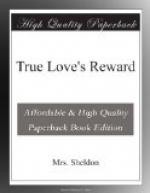“Oh,” cried Mona, in deep distress, “what, then, shall I do? I do not care so much about the property as I do about learning more about my mother. I will tell you frankly,” she went on, with burning cheeks and quivering lips, “that I know there is some mystery connected with her married life; my uncle told me something, but I have reason to believe that he kept back much that I ought to know,” and Mona proceeded to relate all that Mr. Dinsmore had revealed to her on her eighteenth birthday, while the lawyer listened with evident interest, his face expressing great sympathy for his fair young visitor.
“I am very glad to have you confide in me so freely,” he remarked, when she concluded, “and I will deal with equal frankness with you so far as I may. Our reason for advertising for information regarding Miss Mona Forester was this: I received recently a communication from a lawyer in London, desiring me to look up a person so named, and stating that a certain Homer Forester—a wool merchant of Australia—had just died in London while on his way home to America, and had left in his lawyer’s hands a will bequeathing all that he possessed to a niece, Miss Mona Forester, or her heirs, if she was not living. The date and place of her birth were given, but further than that Homer Forester could give no information regarding her.”
“Where was she born?” Mona here interposed, eagerly, “Oh, sir, it is strange and dreadful that I should be so ignorant of my own mother’s history, is it not?”
“Miss Forester, according to the information given in her uncle’s will, was born in Trenton, New Jersey, March 10th, 1843, but that is all that I can tell you about her,” bestowing a glance of sympathy upon the agitated girl. “You say that she died at the time of your birth. I wish you could bring me proof of this and that you are her daughter; but of course your mere assertion proves nothing, nor your possession of this picture, which may or may not be her. Believe me, I should be very glad to surrender this property to you if it rightly belongs to you.”
“Of course I should like to have it, if I am the legal heir,” Mona said, thoughtfully; “but,” with a proud uplifting of her pretty head, “I can do without it, for I am able to earn my own living.”
“Is there no one to whom you can appeal? How about Mr. Dinsmore’s wife, who succeeded in getting all his property away from you—could she prove anything?” and Mr. Corbin regarded his companion with curious interest as he asked the question.
“I do not know—I have never even seen her,” said Mona, thoughtfully; “or, at least, if I have, it must have been when I was too young to remember anything about her; besides, I should not know where to find her. There is only one person in the world, I believe, who really knows anything about me.”
“And who is that?” interposed Mr. Corbin, eagerly.
“Mrs. Richmond Montague, my father’s second wife.”




